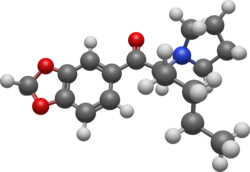Chemistry:MDPHP
From HandWiki
Short description: Chemical compound
 | |
 | |
| Legal status | |
|---|---|
| Legal status |
|
| Identifiers | |
| |
| CAS Number | |
| PubChem CID | |
| ChemSpider | |
| UNII | |
| Chemical and physical data | |
| Formula | C17H23NO3 |
| Molar mass | 289.375 g·mol−1 |
| 3D model (JSmol) | |
| |
| |
MDPHP (3',4'-Methylenedioxy-α-pyrrolidinohexiophenone) is a stimulant of the cathinone class originally developed in the 1960s,[1] which has been reported as a novel designer drug. In the UK its slang name is monkey dust.[2][3] It is closely related to the potent stimulant MDPV though with slightly milder effects, and has been used as an alternative in some countries following the banning of MDPV.[4][5][6][7]
Legal status
MDPHP is specifically listed as a controlled substance in Japan [8] and Hungary,[9] and is controlled under analogue provisions in a number of other jurisdictions.
Documented fatalities
A case of a "fatal acute intoxication caused by MDPHP" in a 48 year old male was reported in February 2022 by physicians at an Italian hospital.[10]
See also
- α-Pyrrolidinohexiophenone (α-PHP)
- 3',4'-Methylenedioxy-α-pyrrolidinopropiophenone (MDPPP)
- 3F-PHP
- 4F-PHP
- 4-Cl-PHP
- N-Ethylhexedrone
- N-Ethylhexylone
- MDPEP
References
- ↑ Koeppe H, Zeile K, Ludwig G, "Patent DE - Verfahren zur Herstellung von α-Aminoketonen mit heterocyclischer Aminogruppe", DE patent 1545591, issued 28 May 1965
- ↑ "Monkey Dust drug use 'an epidemic', emergency workers warn". BBC. 10 August 2018. https://www.bbc.com/news/uk-england-stoke-staffordshire-45144531.
- ↑ Roberts M. Monkey dust drug clampdown could be coming in UK. BBC News, 11 May 2023
- ↑ "Recently abused synthetic cathinones, α-pyrrolidinophenone derivatives: A review of their pharmacology, acute toxicity, and metabolism". Forensic Toxicology 32: 1–8. 2013. doi:10.1007/s11419-013-0218-1.
- ↑ "Three 25-NBOMe-type drugs, three other phenethylamine-type drugs (25I-NBMD, RH34, and escaline), eight cathinone derivatives, and a phencyclidine analog MMXE, newly identified in ingredients of drug products before they were sold on the drug market.". Forensic Toxicology 34 (1): 108–14. January 2016. doi:10.1007/s11419-015-0293-6.
- ↑ "Intoxications in the STRIDA project involving a panorama of psychostimulant pyrovalerone derivatives, MDPV copycats". Clinical Toxicology (Philadelphia, Pa.) 56 (4): 256–263. April 2018. doi:10.1080/15563650.2017.1370097. PMID 28895757.
- ↑ "Identification and classification of cathinone unknowns by statistical analysis processing of direct analysis in real time-high resolution mass spectrometry-derived "neutral loss" spectra". Talanta 179: 546–553. March 2018. doi:10.1016/j.talanta.2017.11.020. PMID 29310273.
- ↑ "指定薬物名称・構造式一覧(平成27年9月16日現在)" (in Japanese). 厚生労働省 (Ministry of Health, Labour and Welfare). 16 September 2015. http://www.mhlw.go.jp/seisakunitsuite/bunya/kenkou_iryou/iyakuhin/yakubuturanyou/dl/meisho.pdf.
- ↑ "A Daath.hu kiegészítése a BSZKI "designer jogi listáján" nem szereplő, de a C-lista 1.-4. szerkezeti leírásainak megfelelő, illetve a C-lista 5. felsorolásában szereplő néhány anyagról" (in Hungarian). http://www.daath.hu/incoming/designer_jogi_lista_20150903_BSZKI_Daath_kieg.pdf.
- ↑ "A unique case of death by MDPHP with no other co-ingestion: a forensic toxicology case". International Journal of Legal Medicine 136 (5): 1291–1296. September 2022. doi:10.1007/s00414-022-02799-w. PMID 35169902.
 |

